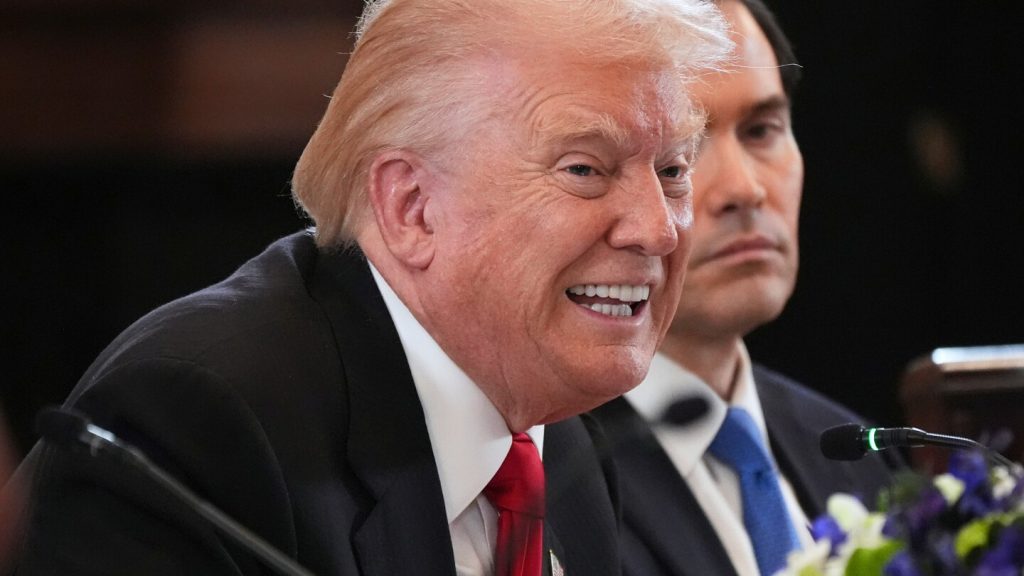Listen to the article
Trump Seeks Critical Minerals Partnership with Central Asian Nations Amid China Tensions
President Donald Trump hosted leaders from five Central Asian countries at the White House on Thursday, seeking to secure access to rare earth metals vital for high-tech manufacturing as the United States works to reduce its dependence on Chinese supplies.
The bilateral meetings and working dinner included presidents from Kazakhstan, Kyrgyzstan, Tajikistan, Turkmenistan, and Uzbekistan – nations that Trump acknowledged have been historically overlooked by previous administrations.
“These nations were once home to the ancient Silk Road connecting East and West,” Trump said during the summit. “Sadly, previous American presidents neglected this region completely. I understand the importance of this region, but a lot of people don’t know that.”
The meetings come at a critical moment in U.S.-China trade relations. Beijing recently agreed to delay new export restrictions on rare earth elements by one year following talks between Trump and Chinese President Xi Jinping in South Korea last week. This temporary thaw addresses a key point of friction that has complicated ongoing trade negotiations between the world’s two largest economies.
China currently dominates the global market for these critical minerals, accounting for nearly 70% of worldwide rare earth mining and controlling approximately 90% of global processing capacity. These materials are essential components in smartphones, electric vehicles, fighter jets, and other advanced technologies.
Central Asia represents a potentially valuable alternative source for these critical resources. The region holds significant reserves of rare earth minerals and produces roughly half the world’s uranium, crucial for nuclear power generation. However, developing these resources requires substantial investment and infrastructure.
“In recent weeks, my administration has strengthened American economic security by forging agreements with allies and friends across the world to broaden our critical minerals supply chains,” Trump stated during the summit.
The visiting Central Asian leaders reciprocated the president’s enthusiasm. Tajikistan’s President Emomali Rahmon highlighted his country’s “very rich, boundless” mineral resources while acknowledging the geopolitical challenges of being situated between Russia and China.
“We are very keen to continue closely our cooperation on security items, which we are so concerned for,” Rahmon said, underscoring the strategic value of strengthening ties with the United States.
Currently, Central Asia’s critical mineral exports predominantly flow to China and Russia. For instance, Kazakhstan exported $3.07 billion in critical minerals to China and $1.8 billion to Russia in 2023, compared to just $544 million to the United States, according to data from the Observatory of Economic Complexity.
A bipartisan group of senators has introduced legislation to repeal Soviet-era trade restrictions that have limited American investment in these nations since they gained independence following the Soviet Union’s collapse in 1991.
“Today, it’s not too late to deepen our cooperation and ensure that these countries can decide their own destinies,” said Republican Senator Jim Risch of Idaho, chairman of the Senate Foreign Relations Committee and a sponsor of the legislation.
Secretary of State Marco Rubio met with the Central Asian leaders at the State Department on Wednesday to mark the 10-year anniversary of the C5+1 diplomatic platform. “We oftentimes spend so much time focused on crisis and problems that sometimes we don’t spend enough time focused on exciting new opportunities,” Rubio said.
The summit also yielded diplomatic gains beyond mineral resources. Kazakhstan’s President Kassym-Jomart Tokayev agreed to join the Abraham Accords, the Trump-led initiative that has established diplomatic and commercial ties between Israel and several Arab nations. Although Kazakhstan has maintained diplomatic relations with Israel since 1992, this move represents a symbolic revival of what Trump considers a signature foreign policy achievement from his first term.
Trump expressed optimism about expanding the accords further, particularly as Iran’s regional influence diminishes. “One of the reasons is, we are right now in negotiations, or talks, with many countries that really wanted to come in, but they couldn’t because of the status of Iran — where Iran had a possibility of nuclear weapons, which they do not have now,” Trump stated.
The president also expressed confidence in the durability of the Gaza ceasefire, describing it as “not tentative” but rather “very strong peace.”
Fact Checker
Verify the accuracy of this article using The Disinformation Commission analysis and real-time sources.




8 Comments
Reducing dependence on China for rare earth metals seems like a prudent move for the US, but it will require careful diplomacy and cooperation with Central Asian nations. I hope this summit lays the groundwork for mutually beneficial arrangements.
Agreed, the geopolitical dynamics around rare earths are very complex. Striking the right balance between economic, security, and environmental concerns will be crucial.
This is an important issue that has flown under the radar for too long. I’m glad to see the Trump administration prioritizing access to critical rare earth minerals from sources outside of China.
Curious to see if this engagement with Central Asian leaders leads to any concrete deals or partnerships on rare earth minerals. The geopolitical implications could be quite significant if the US can reduce its reliance on China in this strategic sector.
The rare earth metals issue highlights the need for greater supply chain diversification globally. I wonder how the US plans to work with these Central Asian partners to develop new mining and processing capabilities.
Good point. Establishing reliable and sustainable rare earth supply chains will likely require significant investment and technology sharing between the US and these nations.
This is an interesting move by the Trump administration to secure access to critical rare earth minerals from Central Asia. Reducing reliance on Chinese supplies is important for US manufacturing and technology sectors.
Agreed, the geopolitical dynamics around rare earth metals are quite complex. This could be an opportunity for greater economic cooperation between the US and Central Asian nations.